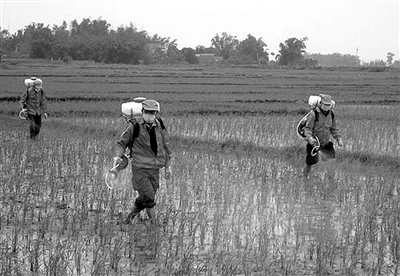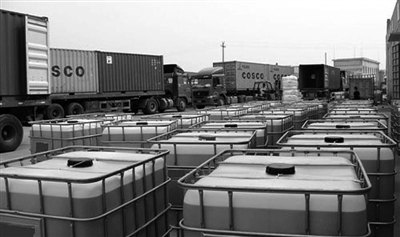
Glyphosate is the world's largest herbicide pesticide. The picture shows farmers spraying glyphosate in the field. (This version is provided by CFP.)
Glyphosate is the world's largest herbicide pesticide and has been the world's top pesticide sales list. As early as 2007, China has become the world's largest producer and exporter of glyphosate. Today, the time has come to 2011, CCIN reporter found that as the world's largest glyphosate country, China's production of glyphosate is still no patent, no export registration license, no brand of "three no" products.
The "first" from glory to failure
This year, China has been maintaining the status of the first major country of glyphosate for five years. In reviewing these five years, the domestic price of glyphosate has undergone a cycle. As a result of the closure of a glyphosate production line with an annual output of 100,000 tons by the US-based company Monsanto, a glyphosate founding company, and the large-scale planting of crops such as genetically modified soybeans and corn, the global demand for glyphosate has increased. Since 2007, domestic Glyphosate prices have been rising all the way. At that time, the price of domestic glyphosate started to soar from less than 30,000 yuan per ton. By 2008, the domestic price of glyphosate had exceeded the threshold of 110,000 yuan/ton, and the cumulative increase was nearly 400%. After 2008, with the outbreak of the international financial crisis, coupled with Monsanto’s stated intention to restore glyphosate production and reduce imports from China, the price of domestic glyphosate was forced to bow, and the price fell from the sky price in 2008 all the way to 25,000 yuan / ton, no further breakthroughs thereafter. Until now, domestic prices of glyphosate have returned to five years ago.
At present, the days of domestic glyphosate companies have been extremely difficult, the products have been sluggish for two consecutive years, the profitability level is not high, and some companies have even suffered losses. The operating rate of the glyphosate industry is also extremely low. Since the end of 2008, over half of the entire industry has been parked. Recently, an industry source said in an interview with CCIN reporters that at present there are only a few large factories in China still operating. After a lot of small factories that had stopped, they still did not drive. It is estimated that the overall operating rate of the industry is only 30% to 40%.
Has been working for the "three no"
Why is the world's largest glyphosate country mixed?
CCIN reporter recently learned from a number of people in the industry that because global demand for glyphosate is concentrated in foreign countries, about 80% of domestic glyphosate crude drugs are exported. China's glyphosate product has always been a “three-nothing†product with no patents, no export registration license, and no brand, so it can only work for foreign markets, and prices can only look at the faces of foreign markets.
No patent. Glyphosate is an efficient herbicide. In 1971, this product was developed by the Monsanto company in the United States. During the patent period of the product, glyphosate made Monsanto’s company pour full. By 2001, Monsanto's patent on glyphosate had expired, which meant that this product became a non-proprietary pesticide. Until that time, the domestic glyphosate industry began to develop greatly. An industry source told CCIN reporters that on the issue of patents, China's glyphosate company has no confidence at the beginning and can only copy other people's products. It is also because of patent reasons that most of the Chinese glyphosate companies only produce glyphosate, which is at the bottom of the glyphosate industry chain and has the lowest added value.
No export registration license. This is the biggest weakness of Chinese glyphosate companies. "Products that must be exported must be registered and managed by local importing countries. Without registration, they cannot be sold locally. At present, almost all countries have registration management, but they are strictly non-strict issues," said Wang Luxian, Honorary Chairman of the China Pesticide Industry Association. “Because the registration fee is too high, for example, the registration of a pesticide species in the United States requires several million US dollars, the time spent in the middle is very long, and the material requirements are very strict, so most of the domestic glyphosate companies cannot afford it.†Fujian Sannong Group shares Market Development Division Cheng Wangyu told the CCIN reporter. As a result, small and medium-sized enterprises more than choose to give up and feel at ease as a "generation processing factory" of agrichemical giants.
According to CCIN reporters, in the absence of an export registration certificate and export, domestic export companies mostly sell their products to intermediate agents who have product registration certificates, which are then resold by the latter. As a result, most of the profits were taken away by middlemen. Data show that in 2007, China's average export price of glyphosate was 5,000 to 5,500 U.S. dollars per ton, while the average price in the U.S. market was 29,000 U.S. dollars per ton (purple). Although the huge spread between the two has changed since then, it has continued until now.
no brand. An industry source told CCIN that at present there are almost no domestic brands of glyphosate. Zhang Siping, special contributor to the "Pesticide Market Information" has made statistics: Swiss Syngenta and Nantong Jiangshan Pesticide Chemical Co., Ltd., German Hamm and Jiangsu Yangnong Chemical Co., Ltd., Argentinean Adanol Company and Anhui Huaxing Chemicals Co., Ltd., New Zealand Australia and Leshan Fuhua Co., Ltd. have signed long-term cooperation agreements with Chinese companies to OEM products for foreign companies.
In the interview, an insider also disclosed to the CCIN reporter the embarrassment that was caused by the lack of domestic brands of glyphosate. Some multinational corporations imported the glyphosate crude drug at the bottom of the industrial chain from China, and after two deep processing, they exported the glyphosate preparation with higher added value to China. The Monsanto company's Roundup brand is one of them. In addition to being sold in the United States, the product was also exported to China and achieved a very good sales performance. In other words, Chinese companies export themselves “self†at extremely low prices, and import themselves “self†at extremely high prices.

About 80% of the original glyphosate produced in China is exported. The picture shows a glyphosate product that is being loaded by an enterprise in Zhejiang. CFP
The way to seek independence
Faced with such an embarrassing situation, what actions should domestic glyphosate companies take? Some people in the industry put forward their own views.
The most urgent task is to encourage and guide the original pharmaceutical companies of glyphosate to take the deep processing of preparations. According to industry insiders, through the deep processing of the original drug and the extension of the product value chain, the glyphosate company can not only realize product value-added, but also can promote the construction of its own brand. For example, processing glyphosate raw powder into 41% glyphosate isopropylamine or 30% ammonium salt is a good direction. According to the CCIN reporter, some domestic glyphosate manufacturers are also exploring new profit points. In October last year, Nantong Jiangshan Pesticide Chemical Co., Ltd. issued an announcement stating that in order to further increase the proportion of the formulation products in the company’s sales revenue and improve profitability, the company decided to implement a project to build 40,000 tons/year of pesticide formulations.
There are also people in the industry suggesting that overseas markets should be developed in a way that “curves save the countryâ€. Even if the registration certificate cannot be obtained directly, overseas markets can be developed by establishing foreign subsidiaries. Qiu Wei, Research Director of Guangdong New Value Investment Co., Ltd. suggested that: "In the future, if domestic pesticide companies wish to enter the high end of the pesticide value chain, they need to enter the downstream distribution field. Enterprises can set up a branch company in foreign markets to register pesticides. Register and establish your own brand; or through joint ventures and cooperation with U.S. registered companies and sales companies to establish a deeper level of contact; or through the acquisition of market sales rights for multinational companies to phase out products to further enrich the product line.â€
According to CCIN reporters, Zhejiang Xinan Chemical Group Co., Ltd., which is aware of this, has started to take action. "We have registered in many places overseas, such as the United States, Argentina, Ghana and other countries. At the same time, the company plans to invest US$9.8 million to set up a wholly-owned subsidiary of Xinan International Holdings Co., Ltd. in the United States, mainly responsible for the company's overseas investment and trading business. A person in charge of Xinan Chemical said in an interview with CCIN reporters. In addition to Xinan Chemical, Anhui Huaxing Chemical Industry Co., Ltd. has also actively changed the model of going out, and the marketing model has changed from the original relying on foreign agents to its own offices, reducing intermediate circulation. At present, the company has set up offices or branches in eight countries such as Vietnam. With the implementation of the internationalization strategy, the company has conducted extensive cooperation with the international agrochemical giants Dow, Monsanto, and Sumitomo in various fields. It has also become a strategic partner through Argentina's Adenau company through trade and property rights cooperation.
Some industry sources stated that companies can also increase their market competitiveness through mergers and acquisitions. “Some small and medium-sized enterprises are in the state of restricting production and stopping production. They are under pressure to survive and hope to find a suitable buyer. At this time, powerful companies can promptly use shots to increase production scale and increase market share through mergers and reorganizations. The rate will promote the integration of resources and the return of market order in the entire industry,†said Zhou Chun, director of the Petroleum and Chemical Commodity Department of China Minmetals Chemicals Import & Export Chamber of Commerce.
According to some media reports, the resistance of large areas of long-term use of glyphosate has become increasingly apparent. Monsanto began researching new transgenic seeds in 2005. Among them, soybean and cotton seeds with dicamba-resistance added on the basis of glyphosate are currently in the field experiment stage and are expected to be launched globally in 2012. Monsanto estimates that by 2012, the company's genetically modified and seed businesses will account for 85% of its total gross profit. Many industry insiders have therefore reminded that domestic companies cannot pressure all their investments on glyphosate. According to a person in charge of Xinan Chemical, in the long run, the proportion of glyphosate business in the company will certainly decline. The company will take this opportunity to adjust the product structure and promote the diversification of the downstream industries so as to achieve profit diversification. It is understood that the company is also actively promoting the comprehensive utilization of silicone and glyphosate projects.